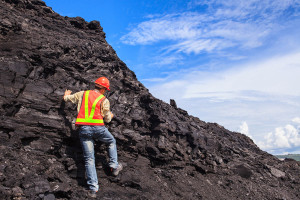
What Does a Geoscientist Do?
Geoscience is the study of the earth's history and how it functions and interacts with the surrounding biospheres. Geoscientists study the earth's many different facets, including its geological composition, processes, and history. Their primary way of doing this is often through planning and conducting studies in the field, which involves traveling to a specific location and collecting samples. Geoscientists then analyze these samples and share their findings with any interested parties, as well as other scientists. Sometimes they use other tools like aerial photographs or drilling records to help locate deposits of oil, precious gems, and other resources.
Where Does a Geoscientist Work?
Geoscientists usually spend a great deal of time working in the field, but also work in laboratories. Fieldwork typically involves traveling to distant and sometimes isolated locations for extended periods of time. They may be required to brave adverse weather conditions and perform physically demanding tasks. When working in the lab, they are often required to utilize advanced equipment and specialized computer programs to analyze data.
Most work full-time with a great deal of potential for overtime or strange hours when conducting fieldwork.
What Is the Average Geoscientist Salary?
Geoscientists earned a median salary of $93,580 as of May 2020. The bottom 10% earned about $51,890, while the top 10% earned more than $201,150 during this time.*
Most of these scientists work for oil and gas extraction companies, while others work for private engineering services and consulting companies. A smaller percentage work for the state or federal government.
What Is the Job Demand for Geoscientists?
The job demand for Geoscientists is expected to increase by 7% between 2020 and 2030.* Growing demand for environmental resources and improvements in extraction technologies are increasing the demand for this profession, as well as the design and construction of alternative energy fields.
What Are the Educational Requirements to Become a Geoscientist?
Geoscientists require a bachelor's degree in geosciences, geology, physics, or related field for entry-level positions, though this is rarely sufficient for achieving a higher paying position. Most actually hold a master's or Ph.D., particularly if they are seeking out research or teaching positions.
Possessing computer knowledge is also incredibly important for this position, meaning that those wishing to enter the field should acquire as much hands-on experience with specialized programs as possible. In addition, some Geoscientists may need to be licensed in some states.
Read more about geoscience degrees online.
Degrees Related to Geoscience
What Kind of Societies and Professional Organizations Do Geoscientists Have?
Geoscientists and those who wish to enter the field can also browse through these organizations for valuable resources:
- Geological Society of America is the foremost professional association for geologists of all stripes. It has 18 divisions, including one for Environmental and Engineering Geology. It also organizes networking opportunities through geoscience travel and tours.
- American Geosciences Institute (AGI) is a non-profit organization that provides numerous sources of industry-specific information in the Geoscience field through publications, annual conferences, and encouraging communication across different disciplines. This organization also works to increase public awareness of environmental health and safety.
- Association for Women Geoscientists (AWG) is an international professional organization dedicated to bolstering women's role in Geoscience. They provide scholarships, awards, mentoring opportunities, and networking services for women hoping to advance their careers or young women breaking into the field. In addition, the organization offers numerous industry-specific publications and public events to encourage communication in the field.
*2020 US Bureau of Labor Statistics salary figures and job growth projections for geoscientists reflect national data not school-specific information. Conditions in your area may vary. Data accessed September 2021.





